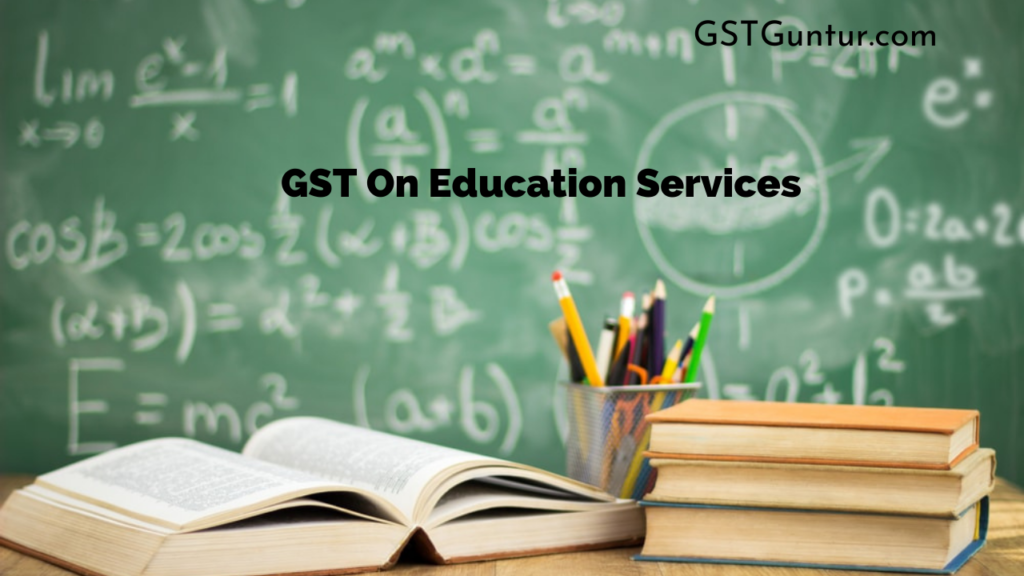GST On Education Services: Education is defined as the process of training and development of a student’s knowledge, skill and character by normal schooling. The government has an obligation to provide free and elementary education to every child and therefore taxing of the education sector has always been a sensitive issue. Education is seen as a social activity more than a business one but commercialisation of education is also a reality.
It makes sense to exempt educational institutions from tax to promote education but the distinction between core and ancillary education is blurring. The education sector has become an organised industry with huge revenues. Therefore, to maintain a fine balance in the sector to promote education, the core educational services provided and received by educational institutions are exempt from the tax. But other services are to be taxed at a standard rate of 18% GST.
As services provided by educational institutions to students, staff members and faculty are exempt, educational institutions are institutions providing services by the way of education provided-
- Up to higher secondary or equivalent.
- As a part of the curriculum for obtaining a qualification recognised by law for the time being in force.
- As a part of an approved vocational education course.
Educational institutions up to the higher secondary school level are exempted from GST on output services and most of the important services. But some of the input services such as the Canteen, repairs and maintenance etc. provided by the private players are subject to GST law.
Only educational institutions given in the definition of the term are entitled to avail exemptions as per the law and therefore, private coaching centres or other unrecognized institutions self-styled as educational institutions are not not to be treated as educational institutions under the GST law and are not exempted from the GST.
For charitable trusts and organisations running schools, colleges or any other educational institutions or performing activities related to the advancement of educational programs specifically for abandoned, orphans, homeless children, physically or mentally abused persons, prisoners or persons over 65 years of age in rural services are exempt from GST as per the Notification No.12/2017-Central Tax(Rate) dated 28th June 2017.
Classification Of Educational Services
As per Notification No. 11/2017- Central Tax(Rate), Education services are classified in heading 9992 and further divided into six subgroups as given below.
| Heading and Group | Service Code (tariff) | Description |
| Heading No. 9992 | Education Services | |
| Group 99921 | Pre-primary education services | |
| 999210 | Pre-primary education services | |
| Group 99922 | Primary education services | |
| 999220 | Primary education services | |
| Group 99923 | Secondary Education Services | |
| 999231 | Secondary Education Services, General | |
| 999232 | Secondary Education Services, Vocational and Technical | |
| Group 99924 | Higher Education Services | |
| 999241 | Higher Education Services, General | |
| 999242 | Higher Education Services, Technical | |
| 999243 | Higher Education Services, Vocational | |
| 999244 | Other Higher Education Services | |
| Group 99925 | Specialised education services | |
| 999251 | Specialised education services | |
| Group 99929 | Other education, training and educational support services | |
| 999291 | Cultural education services | |
| 999292 | Sports and recreation education services | |
| 999293 | Commercial training and coaching services | |
| 999294 | Other education and training services | |
| 999295 | Services involving the conduct of examination for admission to educational institutions | |
| 999299 | Other educational support services |
Rate Of GST
The rate of GST on education services are as follows:
- For chapter/section heading 9992, 18%(9% Central Tax+ 9% State Tax) as per Serial No. 30 of the notification No. 11/2017-Central Tax(Rate) dated 28th June 2017 for educational services.
- For chapter/section heading 9992, NIL as per Serial No. 66 of the notification No. 12/2017-Central Tax(Rate) dated 28th June 2017 for services provided:
- By an educational institution to its staff members, faculty and students.
- To an educational institution, by way of transportation of students, faculty or staff.
- To an educational institution, by way of catering, including mid-day meal schemes by the Central government, State government or Union territory.
- To an educational institution, by way of security, cleaning and housekeeping services performed in such institutions.
- To an educational institution, by way of services related to admission to or conduct of examinations up to higher secondary.
- For chapter/section heading 9992, NIL as per Serial No. 67 of the notification No. 12/2017-Central Tax(Rate) dated 28th June 2017 for services provided by Indian institutes of Management by the way of following educational programmes, except executive development programs as per the guidelines of the Central government-
- Two-year full-time post-graduate diploma in management, to which admissions are made on the basis of CAT (Common Admission Test) conducted by the IIMs.
- Fellow programme in management.
- Five-year integrated programme in management.
- For 90 or any chapter, 5% as per Serial No. 257 of Schedule I of the notification No. 1/2017-Central Tax(Rate) dated 28th June 2017 for technical aids for education, rehabilitation, vocational training and employment of the blind for braille typewriters, braille watches, teaching and learning aids etc.
- For chapter/section heading 9023, 28% as per Serial No. 191 of Schedule IV of the notification No.1/2017-Central Tax(Rate) dated 28th June 2017 for instruments, apparatus and models designed for demonstration and educational purpose which are unsuitable for any other purpose.
Conclusion
Education services provided by educational institutions are fundamental in the national building process and growth. The right to education is a fundamental right of every child mentioned in the constitution of India and therefore the GST law exempts educational institutions up to higher education from the law as per the definition of educational institutions mentioned in the law.
